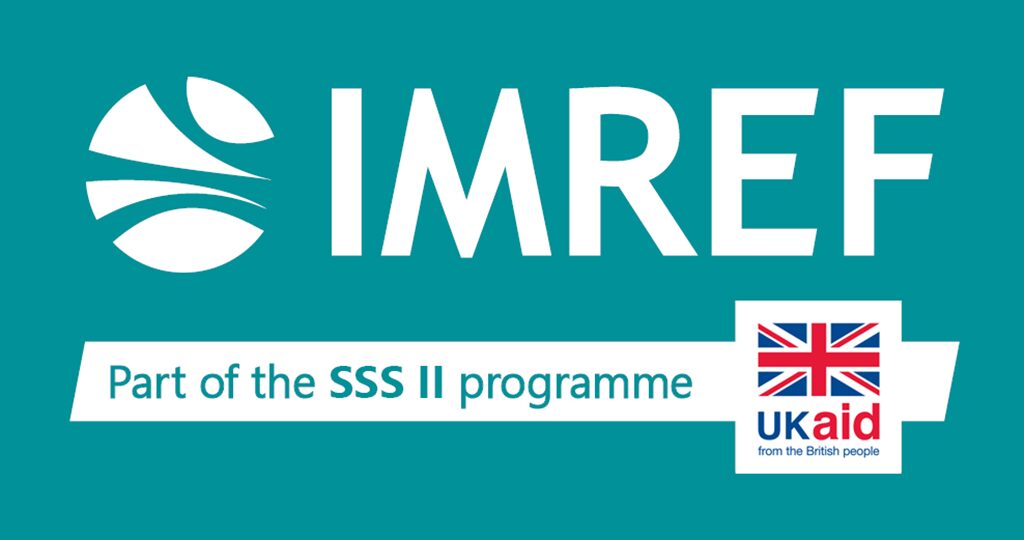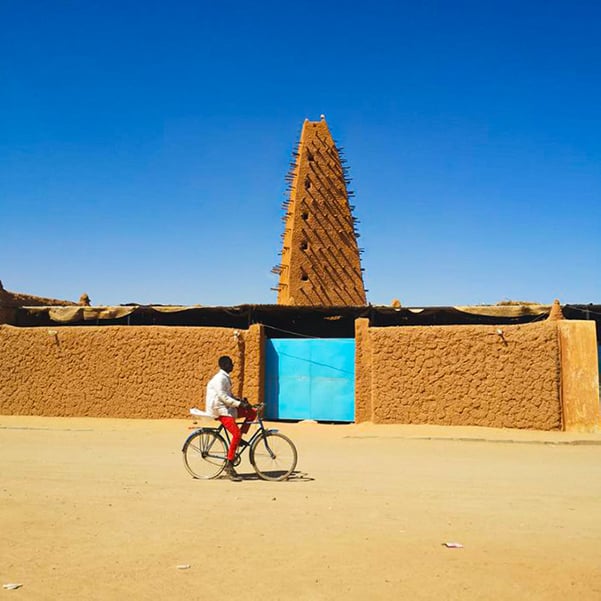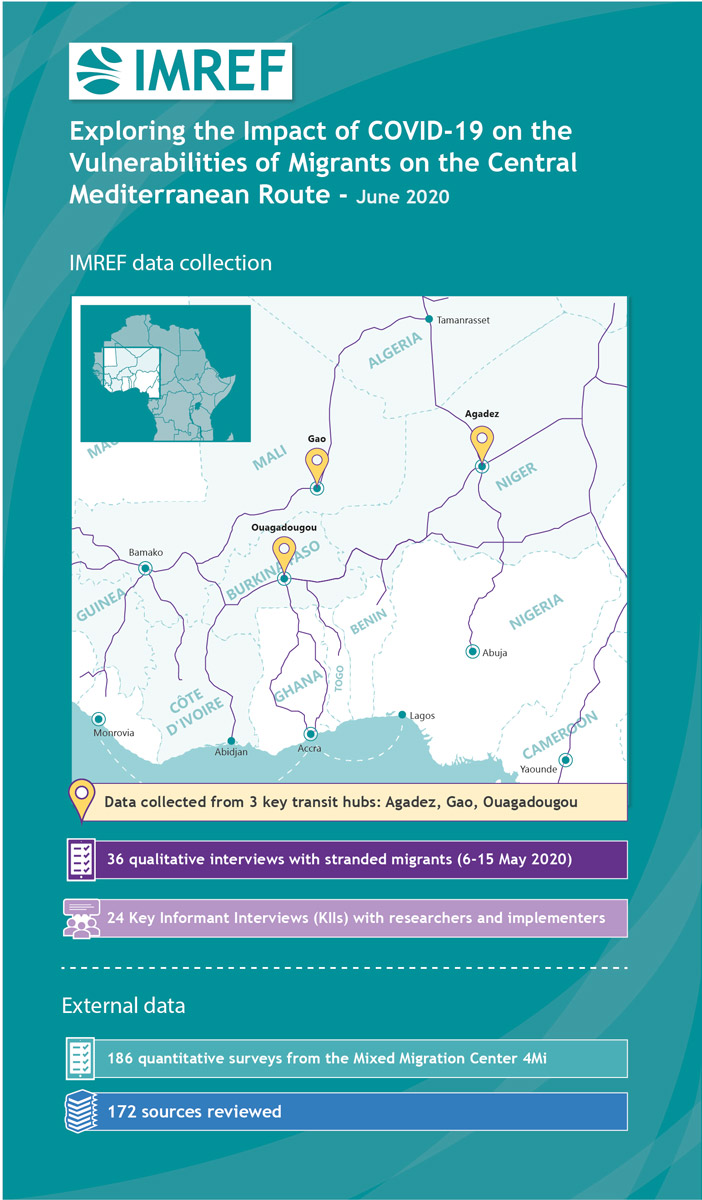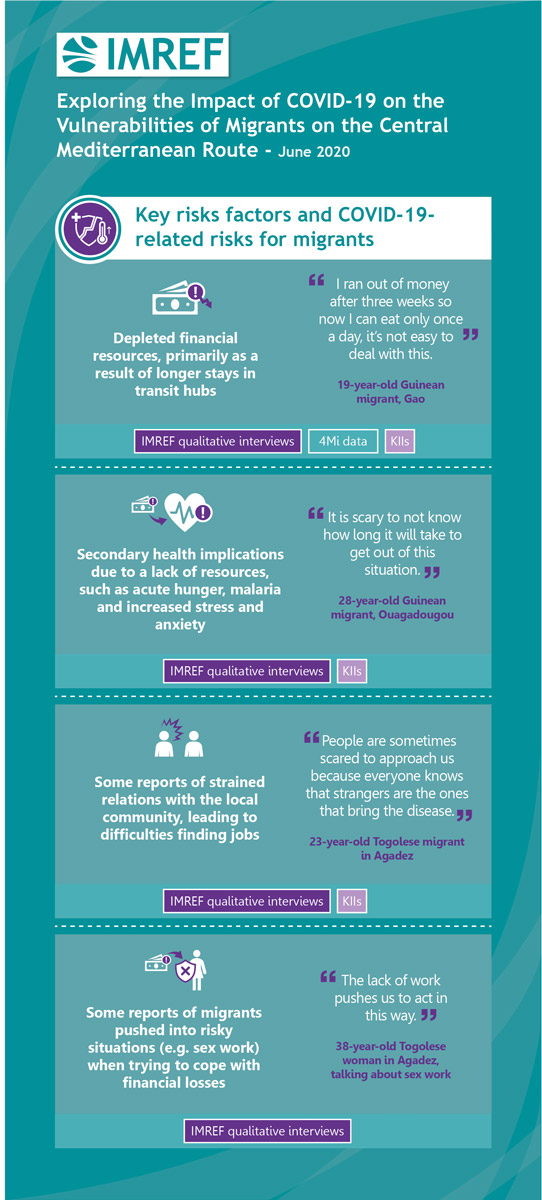Improving Evidence on the Effects of COVID-19 on Migrants and Refugees in West Africa to Inform Better Responses
Improving Evidence on the Effects of COVID-19 on Migrants and Refugees in West Africa to Inform Better Responses
Authored by Sophie Sportiche
Integrity leads a consortium that delivers the Independent Monitoring, Research, and Evidence Facility (IMREF) of the UK Foreign, Commonwealth, and Development Office (FCDO) Safety, Support, and Solutions Phase II (SSS II) programme.
SSS II provides life-saving humanitarian aid including food, medical care and protection services to vulnerable migrants along key migration routes towards Europe. It raises awareness of the dangers of crossing the Sahara and the Mediterranean Sea and assists those who decide to return home to do so safely. It offers sustainable reintegration support to help returnees rebuild their lives and deter risky remigration. Through the provision of data analysis and training it supports governments to improve the management of migration and make it safer, for example by building their capacity to identify and protect asylum seekers and refugees, and tackle people trafficking.
As part of our role on SSS II we recently completed and published a study providing better information for policy makers and humanitarian actors working to support migrants and refugees in West Africa. This research is part of IMREF’s broader support to the FCDO and SSS II implementing partners in response to COVID-19.
Download the full report and executive summary below.
Along mixed-migration routes linking West Africa and the Mediterranean, migrants and refugees often travel in precarious situations, characterised by limited access to services, a lack of human rights protection, and increased risk of violence, exploitation, and abuse. As the COVID-19 pandemic emerged, the international community raised concerns about how the outbreak and measures put in place to slow transmission would affect the well-being of migrants and refugees and called on global COVID-19 responses to account for their needs. However, to support an effective response, humanitarian and development actors faced a dearth of information about how the pandemic was affecting people in migration flows.
In April 2020 Integrity conducted an important desk review which confirmed that available literature relied largely on assumptions and there was very limited research drawing on the voices of migrants and refugees themselves.


Improving Evidence Through Remote Data Collection
To improve the information available for policymakers and humanitarian actors working to support people in West African migration flows, Integrity and its partners therefore completed a three-month research study looking at how COVID-19 and restrictions put in place to stem the curb of the virus have affected the vulnerability of migrants and refugees. Commissioned by the FCDO, the study brought together multiple sources of primary and secondary data to address the lack of reliable information and engage migrant and refugee voices in understanding the effect of COVID-19 on these populations.
Despite the challenges COVID-19 restrictions posed for conducting primary data collection, the study drew on 36 interviews with migrant and refugees in three key transit hubs in West Africa (Ouagadougou, Agadez, and Gao). We accessed these voices by mobilising existing field networks, allowing researchers to reach migrants and refugees remotely and conduct interviews over the phone. This helped protect respondents and researchers from risk of COVID-19 infection. To complement their direct accounts of their own experiences, we also spoke with leading researchers and humanitarian migration actors and drew on quantitative surveys collected with migrants and refugees on the effects of COVID-19 by the Mixed Migration Centre, an independent analytical institute providing independent and high-quality data, research, analysis and expertise on mixed migration, as part of its Mixed Migration Monitoring Mechanism Initiative (4Mi).

Key Findings: Decreased Mobility and Increasing Needs
The report found that mobility along main migration routes has decreased significantly due to COVID-19 restrictions. Most migrants and refugees interviewed for the study explained they were waiting for restrictions to ease so they could continue their travel, either to another country or back home. Those seeking to continue their travel indicated that smuggling facilitation, which migrants and refugees rely on to cross the Sahara Desert, had either slowed significantly due to increased border controls or become unaffordable. At the same time, channels for asylum seekers and refugees to access international protection have been increasingly closed off. Some migrants and refugees we interviewed spoke of being unable to flee violence and persecution for places of safety. Throughout the research period, travel bans and border closures constricted humanitarian corridors, with humanitarian actors recording numerous pushbacks and expulsions from Algeria and Libya. Refugee registration processes and resettlement programming were also all but suspended in many countries.
When coupled with the broader economic downturn linked to COVID-19, this decreased mobility has severe implications for migrants and refugees’ ability to avoid or cope with exploitative and harmful situations. Migrants and refugees often travel only with sufficient financial resource to complete their journeys. When they don’t even have this, they often engage in informal labour opportunities to fund the remainder of their journeys. Longer stays due to mobility restrictions are depleting limited financial resources, which is compounded by work opportunities becoming increasingly scarce or employers reducing wages. In addition to increasing levels of stress and anxiety, migrants and refugees spoke about how the financial implications of COVID-19 were negatively affecting their access to essential needs such as food, shelter, and basic goods. This was pushing some into exploitative, abusive situations. Meanwhile, states of emergency, measures to stem transmission, and the reprioritisation of humanitarian aid towards the COVID-19 response all limited the availability and visibility of protection services.

Recommendations
The study concludes by making targeted recommendations for humanitarian actors and policy makers working to protect migrants and refugees along migration routes linking West Africa and the Mediterranean. These include policy, programme, and research recommendations required to support a more effective response. As the Covid-19 outbreak evolves, the need to generate high quality evidence remains a crucial aspect of any effective response.
Read the study’s executive summary or the full report. A French-language version of the executive summary is also available.
Integrity and its consortium partners also conducted a desk review on this topic in April-May 2020, which can be accessed here.
Tags
Burkina Faso, Mali, Niger, Research, Evidence, and Analysis,